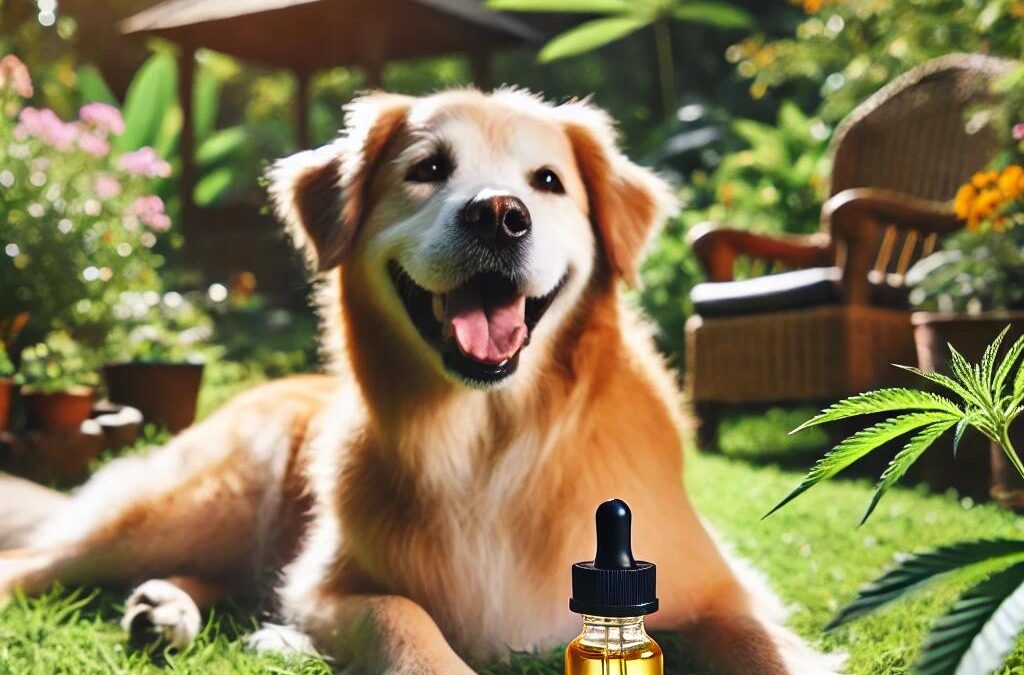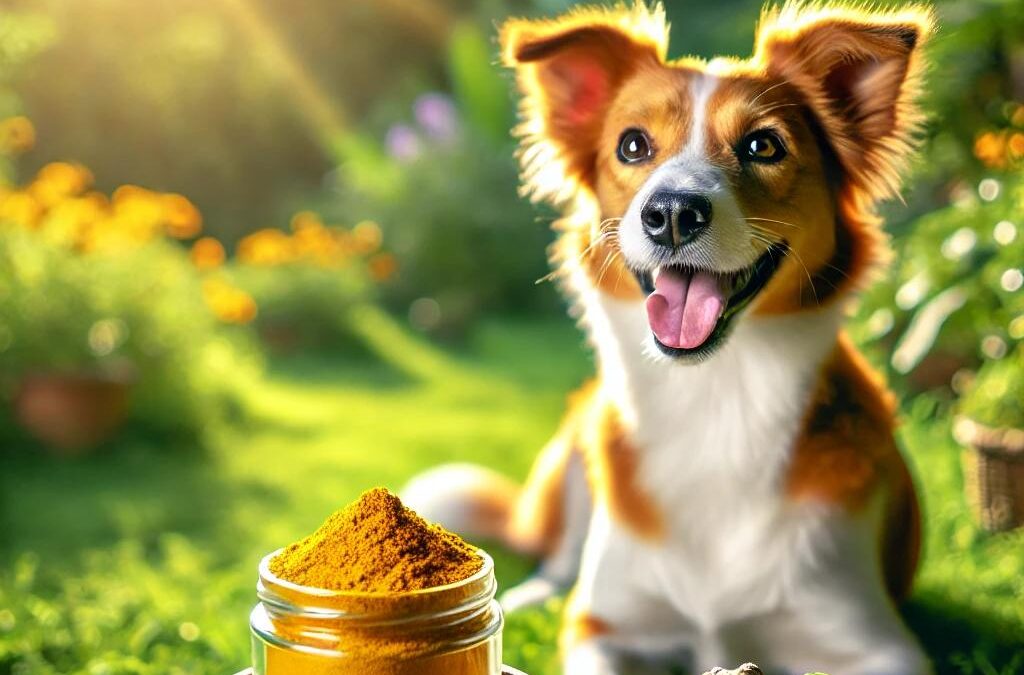
by TCMVET | Sep 10, 2024 | Dog Cancer & Tumors
Keeping your dog at a healthy weight is about more than just mobility and overall well-being—it’s also a crucial aspect of cancer prevention. Studies show that obesity in dogs significantly increases the risk of cancer, primarily due to the chronic inflammation associated with excess body fat. By maintaining an ideal weight through a balanced diet and regular exercise, you can help reduce your dog’s risk of developing cancer while promoting a longer, healthier life.
The Link Between Obesity and Cancer in Dogs
Excess body fat in dogs can trigger a cascade of health problems, from joint issues to heart disease, but one of the lesser-known risks is cancer. Research published in the Veterinary Journal highlights the correlation between obesity and an increased likelihood of certain types of cancers in dogs, including mammary tumors and bladder cancer. Chronic inflammation caused by excessive fat tissue is believed to be a key driver of this increased risk. Inflammation creates an environment in which abnormal cells can grow, increasing the chance of cancer development.
Dogs that are overweight or obese also experience higher levels of oxidative stress and hormone imbalances, both of which contribute to cancer formation. Hormones like insulin and leptin, which are affected by obesity, play a role in cell growth and proliferation, potentially leading to tumor formation.
How to Maintain a Healthy Weight for Cancer Prevention
The good news is that maintaining your dog’s weight within a healthy range is an effective way to reduce cancer risk and improve overall health. Here are some key strategies for keeping your dog fit and healthy:
- Balanced Diet: Work with your veterinarian to establish a diet that is tailored to your dog’s needs. This should include high-quality, nutrient-dense food that provides the right balance of proteins, fats, and carbohydrates. Avoid overfeeding and focus on portion control to prevent weight gain.
- Regular Exercise: Exercise plays a critical role in maintaining a healthy weight. Make sure your dog gets daily physical activity, whether through walks, playtime, or other forms of exercise suited to their age and energy levels. Physical activity helps burn calories, improve metabolism, and reduce the buildup of excess fat.
- Monitor Weight and Body Condition: Regularly check your dog’s weight and body condition to ensure they are staying within a healthy range. Your veterinarian can help assess your dog’s body condition score (BCS) and recommend adjustments to their diet or exercise routine if needed.
- Limit Treats and Snacks: While it can be tempting to reward your dog with treats, it’s important to limit them, especially if your dog is prone to weight gain. Look for healthy treat options, or use vegetables like carrots as low-calorie alternatives.
- Schedule Regular Vet Checkups: Regular veterinary visits are essential for monitoring your dog’s overall health and weight. Your vet can help track your dog’s progress and make recommendations for diet or exercise changes as needed.
Benefits of Maintaining a Healthy Weight Beyond Cancer Prevention
In addition to reducing the risk of cancer, maintaining a healthy weight offers numerous other health benefits for your dog:
- Improved Joint Health: Dogs that maintain a healthy weight are less likely to suffer from joint issues like arthritis, as there is less strain on their bones and joints.
- Better Cardiovascular Health: Weight management supports heart health, reducing the risk of heart disease and hypertension in dogs.
- Enhanced Longevity: Studies have shown that dogs at a healthy weight tend to live longer than their overweight counterparts. By keeping your dog fit, you’re likely adding years to their life.
- Increased Energy and Quality of Life: Dogs that are at an ideal weight tend to be more energetic and have a better overall quality of life. They are more active, agile, and able to enjoy daily activities without the burden of excess weight.
Maintaining your dog’s weight within a healthy range is one of the most effective ways to reduce their risk of cancer and other chronic health issues. By focusing on a balanced diet, regular exercise, and ongoing veterinary care, you can help your dog lead a healthier, happier, and longer life. The proactive steps you take today can significantly impact your dog’s well-being in the future, making weight management a key component of cancer prevention.

by TCMVET | Sep 10, 2024 | Medicines & Therapies
As pet owners seek out ways to improve their dogs’ health, especially when faced with challenging diagnoses like cancer, CBD (cannabidiol) is emerging as a powerful natural option. Derived from the cannabis plant, CBD is non-psychoactive and has been widely studied for its potential in supporting canine health. While its use for managing pain and anxiety in dogs is well-known, recent research highlights its role in cancer therapy, offering potential benefits in reducing tumor growth and enhancing the effectiveness of traditional treatments.
How CBD Can Aid in Canine Cancer Treatment
Cannabidiol works by interacting with a dog’s endocannabinoid system (ECS), a crucial part of maintaining overall health. The ECS regulates key functions such as pain management, immune response, and inflammation. In dogs with cancer, CBD’s ability to influence the ECS is promising, as it can support the body’s fight against cancer while reducing the negative effects of the disease.
Several studies indicate that CBD may play a role in inducing apoptosis, or programmed cell death, in cancer cells, preventing them from multiplying. This ability to selectively target cancer cells while sparing healthy ones makes CBD a potentially powerful tool in combating cancer in dogs.
A study published in the Journal of Pharmacology and Experimental Therapeutics reported that CBD reduced the viability of cancer cells in canine subjects. The findings suggest that CBD may help slow tumor progression, especially in aggressive cancers like lymphoma and osteosarcoma.
Synergistic Effects of CBD with Conventional Cancer Treatments
One of the most exciting aspects of CBD in cancer therapy is its potential to complement traditional treatments such as chemotherapy and radiation. While these treatments are often effective at targeting cancer cells, they can cause significant side effects, including nausea, pain, and fatigue.
Emerging research shows that CBD may reduce these side effects and enhance the efficacy of conventional cancer treatments. By reducing inflammation and providing pain relief, CBD can make the treatment process more tolerable for dogs, improving their quality of life throughout the therapy.
Additionally, CBD has shown the ability to protect healthy cells from damage during chemotherapy and radiation, which could lead to better outcomes and a quicker recovery for dogs undergoing these intensive treatments.
Managing Pain and Anxiety in Dogs with Cancer
Dogs with cancer often face chronic pain and increased levels of anxiety, whether from the disease itself or the treatments they undergo. CBD offers a natural, non-invasive way to manage both conditions. Its interaction with the ECS helps reduce pain signals in the brain, providing relief for dogs suffering from discomfort.
Furthermore, CBD has calming properties that can reduce anxiety levels in dogs, making them feel more comfortable and relaxed during vet visits or while recovering from treatments. This dual effect—managing both physical and emotional stress—makes CBD a valuable tool in improving a dog’s overall well-being as they battle cancer.
Ensuring Safe Use of CBD for Dogs
While CBD is generally well-tolerated by dogs, it’s crucial for pet owners to consult with a veterinarian before introducing it into their pet’s cancer care plan. Dosage and product quality are key factors in ensuring the safety and effectiveness of CBD. Veterinarians can recommend high-quality, third-party tested CBD products that are free from harmful additives or contaminants.
It’s also important to ensure that CBD won’t interfere with any medications your dog may be taking as part of their cancer treatment. A veterinarian can provide guidance on proper dosing, the timing of administration, and any potential interactions with traditional therapies.
The Future of CBD in Canine Cancer Therapy
As research into CBD and its potential therapeutic benefits continues, its role in treating canine cancer is becoming clearer. Whether used to complement traditional treatments or as part of a holistic approach to cancer care, CBD offers a promising way to support the health and comfort of dogs facing this difficult diagnosis.
From reducing tumor growth to managing pain and anxiety, CBD’s wide-ranging effects provide hope for pet owners looking for natural ways to enhance their dog’s cancer treatment plan. As always, it’s essential to work closely with a veterinarian to ensure that CBD is used safely and effectively for your dog’s unique needs.
CBD’s role in canine cancer therapy continues to expand as more research uncovers its potential benefits. From reducing cancer cell viability to improving the effectiveness of traditional treatments and managing pain and anxiety, CBD offers a natural, holistic approach to supporting dogs with cancer. Pet owners interested in incorporating CBD into their dog’s cancer care should seek guidance from a veterinarian to ensure that their pet receives the safest and most effective treatment possible.

by TCMVET | Sep 10, 2024 | pet Chinese herbal medicine
Turmeric, a golden spice commonly used in traditional medicine, is gaining popularity in modern veterinary science for its potential role in preventing and treating cancer in dogs. The active ingredient in turmeric, curcumin, has been studied extensively for its anti-inflammatory, antioxidant, and anti-cancer properties. While it has long been used in human cancer research, recent studies have demonstrated its promising effects in dogs, particularly in combating various forms of canine cancer.
The Power of Curcumin in Canine Cancer Treatment
Curcumin, the bioactive compound in turmeric, works by modulating several cell signaling pathways. This enables it to target multiple aspects of cancer development, including tumor growth, metastasis (the spread of cancer), and the survival of cancer cells. Unlike some conventional cancer treatments, curcumin’s ability to affect various cancer types makes it a versatile option for cancer prevention and support in dogs.
A study focusing on dogs with osteosarcoma, a type of bone cancer common in large dog breeds, revealed that curcumin could significantly reduce tumor growth and limit metastasis. Osteosarcoma is notoriously aggressive, often requiring limb amputation and chemotherapy, but the study’s findings suggest that curcumin may serve as an additional line of defense against this disease. Other canine cancers, such as lymphoma and mast cell tumors, may also benefit from the anti-cancer properties of curcumin.
Anti-Inflammatory Benefits for Cancer Prevention
One of the major contributors to cancer development in both humans and dogs is chronic inflammation. Persistent inflammation can lead to the formation of cancerous cells over time. Curcumin’s potent anti-inflammatory properties help reduce inflammation throughout the body, thereby lowering the risk of cancer development.
In addition to its anti-inflammatory effects, curcumin is a powerful antioxidant, which helps combat oxidative stress—another factor linked to cancer. Oxidative stress occurs when free radicals, unstable molecules that can damage cells, accumulate in the body. Curcumin neutralizes these free radicals, preventing cell damage and mutations that could lead to cancer.
Turmeric’s Safety Profile and Veterinary Recommendations
One of the greatest advantages of turmeric is its excellent safety profile in dogs. While many cancer treatments can cause significant side effects, turmeric is generally well-tolerated by dogs when used in appropriate doses. This makes it an accessible option for pet owners looking to supplement their dog’s cancer prevention or treatment plan.
However, despite its safety, it’s crucial to consult with a veterinarian before adding turmeric to your dog’s diet. Dosage matters, and turmeric can interact with certain medications, such as blood thinners and anti-inflammatory drugs. Your vet can guide you on the appropriate amount of turmeric for your dog’s size, breed, and health status to ensure it’s administered safely and effectively.
How to Incorporate Turmeric into Your Dog’s Diet
Incorporating turmeric into your dog’s diet can be as simple as adding a small amount of turmeric powder to their food. However, curcumin alone isn’t easily absorbed by the body, so it’s essential to combine it with black pepper, which contains piperine—an ingredient that enhances curcumin absorption by up to 2000%.
Some pet owners opt for ready-made supplements that contain curcumin and other complementary ingredients designed to support cancer prevention. These supplements often come in easy-to-administer forms such as capsules, chews, or powders, but it’s essential to choose high-quality, veterinarian-approved products.
Other Health Benefits of Turmeric for Dogs
Beyond its potential role in cancer prevention and treatment, turmeric offers a host of other health benefits for dogs. These include:
- Joint Health: Curcumin’s anti-inflammatory properties make it particularly useful for dogs suffering from arthritis or joint pain, helping to alleviate discomfort and improve mobility.
- Digestive Health: Turmeric supports healthy digestion by reducing inflammation in the gut, promoting better nutrient absorption and easing gastrointestinal issues like gas and bloating.
- Heart Health: Turmeric’s antioxidant properties help protect the heart by reducing oxidative stress and supporting healthy blood circulation.
- Immune Support: Curcumin helps boost the immune system, making it easier for your dog to fend off infections and other health issues that could contribute to cancer risk.
Turmeric, with its potent anti-inflammatory and anti-cancer properties, offers a promising natural approach to cancer prevention and treatment in dogs. The active compound curcumin has shown significant potential in reducing tumor growth, slowing cancer progression, and supporting overall health. While it’s generally safe for dogs, it’s essential to consult your veterinarian before incorporating turmeric into your dog’s routine to ensure the correct dosage and prevent potential interactions with medications.
By adding turmeric to your dog’s diet, you may not only support their cancer prevention but also improve their quality of life through enhanced joint, digestive, and heart health.

by TCMVET | Sep 9, 2024 | Dog Cancer & Tumors
As loving pet owners, we often focus on nutrition, exercise, and regular vet visits to keep our dogs healthy. However, one key aspect of your dog’s health that often gets overlooked is their dental care. Beyond fresh breath and white teeth, maintaining your dog’s oral hygiene can prevent more serious and life-threatening health conditions, including cancer. While it may seem unrelated, dental health is intricately linked to the overall well-being of your dog.
Why Dental Care Is Critical for Your Dog’s Health
Many people believe that dogs, much like wild animals, don’t require dental care and can naturally handle their oral hygiene. However, the reality is quite different. Dogs, especially domestic ones, are prone to developing plaque, tartar, and periodontal disease without proper dental maintenance. Left untreated, these dental problems don’t just cause bad breath or discomfort; they can lead to serious systemic health issues.
Periodontal disease, a common dental issue in dogs, can introduce harmful bacteria into the bloodstream. This can cause inflammation in vital organs, leading to heart disease, kidney problems, and liver infections. Moreover, studies have shown that long-term periodontal disease may contribute to the development of certain cancers, particularly in the mouth and throat.
The Link Between Poor Dental Health and Cancer
Although the exact mechanism isn’t fully understood, chronic inflammation and bacterial infections caused by poor dental hygiene are believed to increase the risk of cancer in dogs. When the gums and surrounding tissues are constantly inflamed due to bacterial buildup, the body’s immune system is weakened, making it more susceptible to cancerous growths. Oral cancers such as squamous cell carcinoma and malignant melanoma are more likely to occur in dogs with untreated dental disease.
In addition, the bacteria that accumulate in a dog’s mouth can migrate to other parts of the body, including the liver and heart. This systemic spread of bacteria can trigger infections that may increase the risk of tumors in these organs. Early intervention in dental care is crucial to reduce these risks.
How to Keep Your Dog’s Teeth and Gums Healthy
Thankfully, there are many ways you can actively prevent dental disease and reduce your dog’s risk of developing related health issues, including cancer. Here’s how to get started:
- Brush Your Dog’s Teeth Regularly: Brushing your dog’s teeth on a daily basis is the most effective way to remove plaque and prevent tartar buildup. Use toothpaste designed specifically for dogs, as human toothpaste contains ingredients that can be harmful to pets.
- Provide Dental Chews: Dental chews can help remove plaque and stimulate your dog’s gums. Choose chews that are designed to improve oral health, and ensure they are safe for your dog to chew on.
- Schedule Regular Vet Check-Ups: Regular veterinary visits are essential to catch any signs of dental disease early. Your vet may recommend professional cleanings, especially for older dogs or those showing signs of gum disease.
- Feed a Balanced Diet: Certain foods can help support your dog’s dental health. Dry kibble, for example, can be less likely to stick to teeth compared to wet food, and some specialized dental diets are designed to reduce plaque formation.
- Watch for Warning Signs: Keep an eye on your dog’s behavior and look out for signs such as bad breath, drooling, difficulty eating, or bleeding gums. If you notice any of these symptoms, take your dog to the vet immediately for a dental check-up.
The Benefits of Good Dental Health
The benefits of maintaining your dog’s dental health go far beyond a clean smile. Regular dental care can prevent serious health issues like heart disease, liver infections, and even certain cancers. Dogs with healthy teeth and gums are less likely to suffer from chronic pain and discomfort, allowing them to lead longer, happier lives.
Moreover, regular dental care can help you avoid costly treatments down the line. Once periodontal disease progresses to a severe stage, the treatments required to address the issue become more invasive and expensive. By staying on top of your dog’s dental hygiene, you’re making an investment in their long-term health and well-being.
Caring for your dog’s dental health is more than just a cosmetic concern—it’s a vital part of their overall health. By maintaining good oral hygiene, you can prevent a range of serious health problems, including infections, heart disease, and even cancer. Start with simple steps like regular brushing, providing dental chews, and scheduling regular vet check-ups. The rewards will be a healthier, happier dog with a greater chance of a longer life.

by TCMVET | Sep 9, 2024 | Food & Health
When it comes to our dogs, most pet owners know the basics of keeping them healthy—good nutrition, regular exercise, and routine check-ups. However, one critical aspect often overlooked is dental health. Surprisingly, many dog owners are unaware of how vital dental care is to their pet’s overall well-being. In fact, neglecting dental health can have long-lasting consequences for a dog’s quality of life and lifespan.
Why Canine Dental Health is Crucial
For many years, the general assumption was that dogs, like animals in the wild, didn’t need dental care. After all, wolves and other wild animals don’t brush their teeth or visit a vet, and they seem to get by just fine, right? Unfortunately, this assumption is far from the truth. While wild animals may appear to be “fine,” they could actually be suffering from severe dental issues that go unnoticed. These animals don’t live as long as domestic pets, and they often endure pain that we, as pet owners, would never want for our beloved companions.
Dental disease in dogs is not just a problem for their teeth and gums; it has far-reaching effects. Studies have shown that untreated dental issues can lead to systemic problems such as heart valve infections (endocarditis) and liver abscesses. What starts as plaque buildup or gingivitis can quickly turn into something far more serious, affecting your dog’s entire body and potentially shortening their lifespan.
The Hidden Dangers of Dental Disease
Without appropriate dental care, dogs are at risk for a range of health problems. Here are some of the most significant dangers associated with poor canine dental health:
- Pain and Discomfort: Dental disease is excruciatingly painful for dogs. It often goes unnoticed until it’s too late because pets instinctively hide their pain. Regular dental check-ups are crucial to catch issues before they worsen.
- Tooth Loss: As periodontal disease progresses, it can cause the loss of teeth. This not only affects a dog’s ability to eat but also leads to further complications, such as infections and bone loss.
- Heart Disease: Bacteria from untreated dental disease can enter the bloodstream and affect the heart, leading to endocarditis, a condition that can be life-threatening if not treated promptly.
- Liver and Kidney Damage: The bacteria from the mouth can also travel to other organs, including the liver and kidneys, causing serious infections or abscesses.
- Decreased Longevity: Poor dental health has been directly linked to reduced lifespan in dogs. Dogs with severe dental issues may live shorter lives due to the strain dental disease puts on their bodies.
What You Can Do to Protect Your Dog
Preventing dental disease in dogs is easier than you might think. Here are some key steps every pet owner should take to ensure their dog’s dental health remains optimal:
- Regular Teeth Brushing: Brushing your dog’s teeth daily or at least several times a week is one of the most effective ways to prevent plaque buildup and gum disease. Use a dog-friendly toothbrush and toothpaste specifically designed for pets.
- Dental Chews and Toys: Dental chews can help reduce plaque and tartar. Chewing stimulates saliva production, which acts as a natural defense against bacteria.
- Routine Veterinary Dental Exams: Regular dental check-ups with your veterinarian are essential. During these visits, your vet can perform professional cleanings, identify early signs of dental disease, and offer advice on maintaining your dog’s oral health at home.
- Professional Cleanings: Sometimes, brushing and chews aren’t enough. If your vet recommends a professional dental cleaning under anesthesia, don’t hesitate. This procedure allows for thorough cleaning below the gum line, which is crucial for preventing periodontal disease.
Dental health is more than just cosmetic for your dog; it’s a critical component of their overall well-being. Left unchecked, dental disease can lead to serious health issues, chronic pain, and even shorten your dog’s life. As a responsible pet owner, incorporating regular dental care into your routine will ensure your furry friend stays healthy, happy, and pain-free for years to come.
By understanding the importance of canine dental health and taking the necessary steps to protect your dog, you’ll be giving them the best chance for a long, healthy life.






